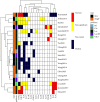Association between Probiotics and Modulation of Gut Microbial Community Composition in Colorectal Cancer Animal Models: A Systematic Review (2010-2021)
- PMID: 37719797
- PMCID: PMC10505085
- DOI: 10.1155/2023/3571184
Association between Probiotics and Modulation of Gut Microbial Community Composition in Colorectal Cancer Animal Models: A Systematic Review (2010-2021)
Abstract
Background: Colorectal cancer (CRC) is one of the most prevalent gastrointestinal malignancies and is considered the third major cause of mortality globally. Probiotics have been shown to protect against the CRC cascade in numerous studies.
Aims: The goal of this systematic review was to gather the preclinical studies that examined the impact of probiotics on the alteration of gut microbiota profiles (bacterial communities) and their link to colorectal carcinogenesis as well as the potential processes involved.
Methods: The search was performed using Scopus, Web of Science, and PubMed databases. Five parameters were used to develop search filters: "probiotics," "prebiotics," "synbiotics," "colorectal cancer," and "animal model."
Results: Of the 399 full texts that were screened, 33 original articles met the inclusion criteria. According to the current findings, probiotics/synbiotics could significantly attenuate aberrant crypt foci (ACF) formation, restore beneficial bacteria in the microbiota population, increase short-chain fatty acids (SCFAs), and change inflammatory marker expression.
Conclusions: The present systematic review results indicate that probiotics could modulate the gut microbial composition and immune regulation to combat/inhibit CRC in preclinical models. However, where the evidence is more limited, it is critical to transfer preclinical research into clinical data.
Copyright © 2023 Shabnam Zeighamy Alamdary et al.
Conflict of interest statement
The authors declare that they have no conflicts of interest.
Figures





Similar articles
-
Preclinical and clinical relevance of probiotics and synbiotics in colorectal carcinogenesis: a systematic review.Nutr Rev. 2020 Aug 1;78(8):667-687. doi: 10.1093/nutrit/nuz087. Nutr Rev. 2020. PMID: 31917829
-
Role of Probiotics in Modulating Human Gut Microbiota Populations and Activities in Patients with Colorectal Cancer-A Systematic Review of Clinical Trials.Nutrients. 2021 Apr 1;13(4):1160. doi: 10.3390/nu13041160. Nutrients. 2021. PMID: 33915854 Free PMC article.
-
Probiotics, prebiotics and colorectal cancer prevention.Best Pract Res Clin Gastroenterol. 2016 Feb;30(1):119-31. doi: 10.1016/j.bpg.2016.02.009. Epub 2016 Feb 19. Best Pract Res Clin Gastroenterol. 2016. PMID: 27048903 Review.
-
Therapeutic methods of gut microbiota modification in colorectal cancer management - fecal microbiota transplantation, prebiotics, probiotics, and synbiotics.Gut Microbes. 2020 Nov 1;11(6):1518-1530. doi: 10.1080/19490976.2020.1764309. Epub 2020 May 26. Gut Microbes. 2020. PMID: 32453670 Free PMC article. Review.
-
Can psychobiotics "mood" ify gut? An update systematic review of randomized controlled trials in healthy and clinical subjects, on anti-depressant effects of probiotics, prebiotics, and synbiotics.Clin Nutr. 2020 May;39(5):1395-1410. doi: 10.1016/j.clnu.2019.06.004. Epub 2019 Jun 12. Clin Nutr. 2020. PMID: 31307840
Cited by
-
Diagnostic Value of Plasma Long Non-coding SLC26A4 Antisense RNA 1 Combined with Magnetic Resonance Imaging in Rectal Cancer.Turk J Gastroenterol. 2024 Nov 28;35(12):900-908. doi: 10.5152/tjg.2024.23558. Turk J Gastroenterol. 2024. PMID: 39641247 Free PMC article.
References
Publication types
LinkOut - more resources
Full Text Sources
Miscellaneous

